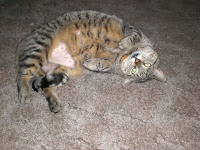 I’d just sent my husband off to his substitute-teaching job after one of his favorite breakfasts. I was virtuous and made him waffles with bits of bacon in them. Before going to the computer for my “work,” I took some time after washing dishes to glance at headlines in the morning paper. On the rug in front of me, Augie our cat began his morning routine, licking his already-overgroomed belly. Parts are so bare they look shaved. I thought of the cliché “navel-gazing,” except in his case it’s “navel-grazing.”
I’d just sent my husband off to his substitute-teaching job after one of his favorite breakfasts. I was virtuous and made him waffles with bits of bacon in them. Before going to the computer for my “work,” I took some time after washing dishes to glance at headlines in the morning paper. On the rug in front of me, Augie our cat began his morning routine, licking his already-overgroomed belly. Parts are so bare they look shaved. I thought of the cliché “navel-gazing,” except in his case it’s “navel-grazing.”“Navel-gazing,” which gives a word picture of constantly inspecting one’s belly button, has come to mean excessive introspection, self-absorption, self-analysis or focus on a single issue. In other words, people start singing a one-note solo, often a pity-party song.
I was thinking about that when I read this headline: “Hit-run victim helped men at homeless shelter.” My momentary sadness deepened when I learned the victim was born with cerebral palsy and was driving his motorized wheelchair when hit by a suspected drunk driver. Tonight, as I do the first Wednesday of every month, I will speak to convicted drunk drivers at an “educational panel” required as part of their sentencing. Two others also speak out about the dangers and prevalence of this serious problem, of which the audience members, because of their arrests, are now a documented part. They’re surprised by the statistics that 12,000 a year die on American roads because of impaired driving. That’s 1,000 a month, about one every 45 minutes. And just as many people grieve their deaths as those who lose a loved one in other tragic circumstances, like war. Most important, drunk-driving deaths are 100% preventable: by not drinking and driving.
Why am I there, since I don’t drink alcohol? Because my family was almost killed by a drinking driver in 1997. Alcohol so impaired his driving abilities that he crossed the center line at too high a speed and smashed into our car. We were about 250 miles from home, headed home from a vacation.Though injured, we survived. But that incident, like the deaths of my parents six months apart when I was 30 and still single, became a defining incident in who I am. Yes, I grieved those losses for a season, but I moved on. I knew I needed to transform the pain into something good instead of prolonging a pity party. In other words, moving past navel-gazing.
Back to the 57-year-old man with cerebral palsy. Despite his disability, he graduated from a university with a major in business and later got a master’s degree in psychology. He was an advocate of handicap-accessible streets and volunteered at several charities, including a shelter for homeless men. For that he received a distinguished award for community service. In an interview after that honor, he said, “I have two choices. I could stay home and be bitter and think ‘poor handicapped me, wah wah,’ or go out and help people and think positively.” Upon reading that, I put down the paper and said “Wow!” That’s a message able-bodied people need. He didn’t spend his life navel-gazing (or even navel-grazing--massaging a certain area of his life to get more sympathy). He pursued compassion and excellence to the limits of his abilities.
I can’t do much about my cat’s excessive grooming. Because he seems healthy otherwise, we’ve decided it’s not that big a deal. We did switch to a gluten-free cat food (more expensive, of course!) upon hearing that it sometimes helps aging cats who overgroom. In a way, I’m glad he has that somewhat-bare belly. For when he does his feline acrobatics to groom, God usually sends me a message: to check where I might be navel-gazing and turn my eyes instead to how He helps me through difficult times. The Bible is full of reminders of that, and one came as I read my Bible just after reading about drunk-driving victim.
But as for me, I will always have hope; I will praise you more and more.
My mouth will tell of your righteousness, of your salvation all day long, though I know not its measure (Psalm 71:14-15).
No comments:
Post a Comment